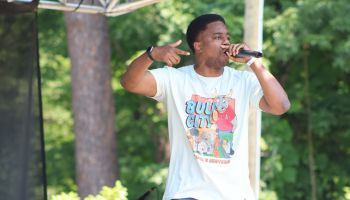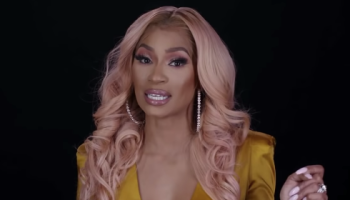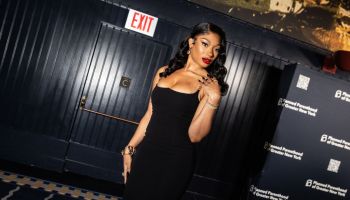
When you mention the name K. Michelle the first reaction most automatically give is, “she’s crazy.” Without hesitation they begin describing the bad behavior of the LHHATL start has exhibited that leads them to this conclusion:
She went off on Rasheeda, throwing candle wax on her.
She pops off on Twitter for no reason.
She always wants to fight.
She says the most vulgar things.
Honestly, I can’t refute any of those things. K does exhibit bad behavior, but I don’t think she’s crazy. I think these behaviors are signs and symptoms of much deeper, unresolved issues. They are the manifestation of suppressed pain.
As a staunch member of #teamkmichelle I have been trying to explain to people for years that K. Michelle is not crazy. Her behaviors are simply her way of dealing with the pain of her past. If you listen to any of her music you will hear her story and hear her pain. She shares her personal bout with insecurity on her latest single, “I Don’t Like Me.”
LISTEN: K. Michelle: “I Don’t Like Me” [OFFICIAL VIDEO]
K. Michelle isn’t the only one suppressing pain and acting poorly. It’s happening to women around the country.
According to an article by Iya Bakare, Carl C. Bell, M.D., president and CEO of the Community Mental Health Council in Chicago, says 20,000 out of every 100,000 African- Americans suffer with depression, which breaks down to approximately 20 percent within the community.
Black women have been taught to be strong and move forward. We don’t share our pain or our stories. We don’t deal with our hurt and pain. When you don’t acknowledge your pain you can’t recover from it and it can lead to depression.
According to the CDC depression is a mental illness that can be costly and debilitating to sufferers. Depression can adversely affect the course and outcome of common chronic conditions, such as arthritis, asthma, cardiovascular disease, cancer, diabetes, and obesity. Depression also can result in increased work absenteeism, short-term disability, and decreased productivity.
Women and blacks are among the groups most likely to meet the criteria for major depression. The National Alliance on Mental Health notes that black women women often reference emotions related to depression as evil or acting out.
An Open Letter To K. Michelle: “Be Quick To Listen, Slow To Speak And Slow To Become Angry”
While many black women are suffering from the disease and openly exhibit behaviors that co-occur with the disease, they often don’t deal with them because it is seen as a weakness not a health issue.
Mental Health America reports:
- 63 percent of African Americans believe that depression is a personal weakness, this is significantly higher than the overall survey average of 54 percent.
- Only 31 percent of African Americans believed that depression was a health problem.
- African Americans were more likely to believe that depression was normal than the overall survey average.
This a situation that has to stop. Black women and the black community must begin to acknowledge depression as a health problem and seek treatment, which can include antidepressant medication, psychotherapy, or a combination of the two.
K. Michelle and Carrie made a commitment to work on their issues and K. Michelle admits that she spoke with a counselor to deal with some of her issues. She’s taken her pain and channeled into making great music and working hard to become a better person.
K. Michelle Delivers Rebellious Soul Tracklist And Album Cover
We all have to do the same.
We have to acknowledge that we don’t like us, we don’t like our behavior and work to change it.
 brandi n. williams, apr (bea) is an award-winning and Accredited public relations professional with nearly 20 years experience. bea has worked with a wide array of clients, including Fortune 500 companies, non-profit organizations, government entities and in the urban entertainment industry. during this time she has established herself as an expert in creating and implementing pr programs that positively impact the community and company bottom-lines. a self-proclaimed hip hop music and pop culture junkie, bea believes healthy communities are formed through open dialogue and critical examination of everything in them – including music, people and art forms.
brandi n. williams, apr (bea) is an award-winning and Accredited public relations professional with nearly 20 years experience. bea has worked with a wide array of clients, including Fortune 500 companies, non-profit organizations, government entities and in the urban entertainment industry. during this time she has established herself as an expert in creating and implementing pr programs that positively impact the community and company bottom-lines. a self-proclaimed hip hop music and pop culture junkie, bea believes healthy communities are formed through open dialogue and critical examination of everything in them – including music, people and art forms.
Follow @beawilliamsapr Friend facebook.com/beawilliamsapr
K. Michelle: We Don’t Like Us Either [OPINION] was originally published on ipowerrichmond.com















